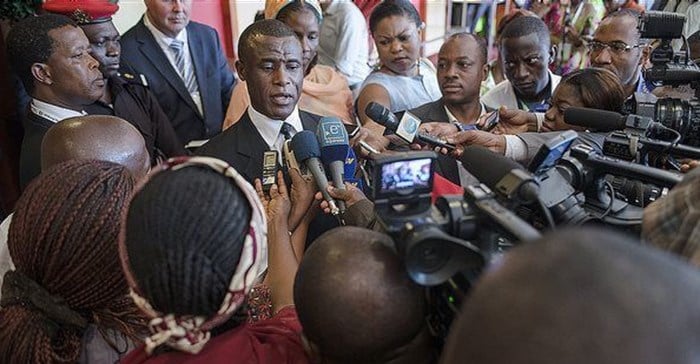
"The Academy is a much-needed resource,” says Amy Minnie, sales consultant of the African Media Agency (AMA), who did the English-translating at the virtual event.
“With information and opportunities scattered across the continent, the Academy will pull this information together into one place, to be the hub where journalists can access all information in one place,” says Eloïne Barry, founder and CEO of AMA.
AMA is an integrated communications agency with a footprint across Africa. Barry explains that they had the idea of the Academy has been an eight-year journey. “However, the past two years have highlighted the increased need for this type of resource.”
Describing the Academy as a “value exchange” Barry says: “The Academy comes as a natural evolution to the work we’ve been passionately doing since we established our network when we looked at the people we work with and their needs.”
The AMA Academy will address four areas:
Barry explains that the Covid pandemic not only gave rise to the spread of misinformation regarding Africa but also saw African media professionals losing out on progressing their skills.
“This has curtailed African journalists’ ability to compete against the global media industry that has unlimited resources and cutting-edge technology,” she says.
“We have identified learning how to monetise content, fact-checking and environmental journalism as the first areas to focus on. Training on data and data journalism as well as gender-based violence, have also been prioritised. Data interpretation can assist journalists to add value to their articles,” says Minnie.
Both Barry and Minnie encourage journalists to put forward the requirements they need.
“The Academy is for them. Anything to equip journalists will be looked at. We will identify gaps and see how we can address this,” says Barry.
“The Academy is a strong collaboration between us and the journalist. We are tailoring it to work for the African journalist,” she adds.
One of their main objectives is skills development.
“We want to help transfer skills across the continent and grow the media industry in order to advance a home-grown narrative across the continent and globally,” says Barry.
With employment identified as a big need, she adds that upskilling will assist journalists to gain better employment. “The speed of technology and change in Africa is so quick, that upskilling is not an option but a necessity.
“Five to 10 years ago no one knew what fintech was, but today if you are not trained in fintech then you are in trouble,” she says.
The Academy will pull together the job opportunities into a classified. “There are freelance jobs out there, but no one knows where to look for them. We tend to all have our own pool of resources that we use over and over again,” says Barry.
The Academy will also launch a social media tool for journalists so that they can speak to each other.
AMA will partner with recognised experts in the industry and established organisations in the field of media innovation and training to design new modules and adapt existing ones to the local requirements across the continent.
“We are grateful for the relationships we’ve forged with our media associates over the years, and we hope that Academy will be the first of many value-based offerings that we can provide across the continent,” she says.
The free courses offered by Academy, which is an accredited programme, will be available in Arabic, English, French and Portuguese, and include certification upon completion.
The first course will be on monetisation. An announcement is expected next week.
Journalists, bloggers and online publication owners interested in being part of the 2022 cohort can register and find out more here
The registration process runs until 25 March 2022.
